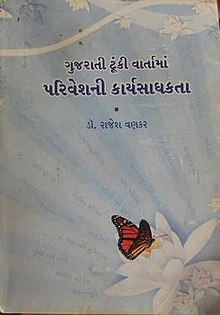Gujarati Tunki Vartama Pariveshni Karyasadhakta
This article may require copy editing for grammar, style, cohesion, tone, or spelling. (July 2018) |
 Coverpage of the book | |
| Author | Rajesh Vankar |
|---|---|
| Cover artist | Ketan Rajyaguru |
| Language | Gujarati |
| Subject | Literary criticism of Short story |
| Set in | Godhra, Gujarat |
| Published | 2012 |
| Publisher | self published |
| Publication place | India |
| Media type | |
| Pages | 512 |
| Awards | Gujarat Sahitya Akademi's Best Book Prize (for research) |
| ISBN | 978-93-81471-24-1 |
Gujarati Tunki Vartama Pariveshni Karyasadhakta (Gujarati: ગુજરાતી ટૂંકી વાર્તામાં પરિવેશની કાર્યસાધકતા) (English: The Function of Setting in Gujarati Short Stories) is a research work on Gujarati short stories in Gujarati language undertaken by Rajesh Vankar for his Ph.D degree. The book gives an extensive description of the works of Setting as an element in a Short story, especially in Gujarati short stories. The book won Best Book Prize (for research) (2012) instituted by Gujarat Sahitya Akademi.[1]
Background
Vankar started this research in 2005 to obtain his Ph.D and completed it in 2010. The research work was published in a book format in 2012 by the financial assistance of Gujarat Sahitya Akademi. The preface of the book was written by Manilal H. Patel.[1][2]
Synopsis
The book is divided into four chapters.
The first chapter, Parivesh: Sangya Ane Suchitartho (Setting: Definition and Meanings) discusses the definition and meanings of Parivesh (Setting) in Indian and World literature. The second chapter, Sahitya Vivechan Kshetre Parivesh Vicharnanu Swarup (Various Concepts of Setting in The Field of Literary Criticism), describes how the Parivesh is criticised by an Indian critic as well as other global critics. The third chapter, Gujarati Tunki Vartama Pariveshni Karyasadhakta (The Function of Setting in Gujarati Short Stories), is divided into other four parts which gives extensive description about the works of Parivesh in the traditional, modern and postmodern Gujarati short stories in the context of Rural setting, Urban setting, Social setting, Backwards area setting, Cultural setting, Historical setting, Mythological setting, Psychic setting, Scientific setting and Dilectual setting. The fourth and last chapter is contains the study about selected 10 Short stories written by Gujarati writers including Dhumketu, Sundaram, Jayant Khatri, Suresh Joshi, Kishor Jadav, Madhu Rye, Shirish Panchal, Mohan Parmar, Nazir Mansuri and Dasharath Parmar.[3]
Awards
The book won Best Book Prize (for research) of 2012 instituted by Gujarat Sahitya Akademi.[1][2]
References
- ^ a b c Parmar, Manoj, ed. (December 2014). "Parichay: Dr. Rajesh Vankar". Dalitchetna. Gandhinagar. ISSN 2319-7862.
- ^ a b Parmar, Manoj (October 2017). Pratiti. Ahmedabad: Rannade Prakashan. pp. 352–353. ISBN 978-93-86685-28-5.
- ^ Vankar, Rajesh (2012). Gujarati Tunki Vartama Pariveshni Karyasadhakta. Godhra. ISBN 978-93-81471-24-1.
{{cite book}}: CS1 maint: location missing publisher (link)
